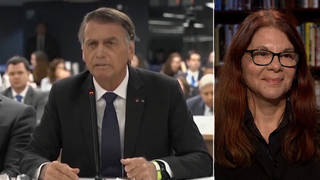
Guests
- Ryan GrimD.C. bureau chief for The Intercept. His latest story is headlined “Ahead of Vote on Gina Haspel, Senate Pulls Access to Damning Classified Memo.”
The Senate Intelligence Committee approved President Trump’s nominee for CIA director, Gina Haspel, sending her confirmation to the full Senate floor. Haspel is a 33-year CIA veteran who was responsible for running a secret CIA black site in Thailand in 2002 where at least one prisoner was waterboarded and tortured in other ways during her tenure. She also oversaw the destruction of videotapes showing torture at the black site. A number of key Democrats have come out backing Haspel, after she said the CIA torture program should never have existed, even though she repeatedly refused to call the CIA’s post-9/11 treatment of prisoners “torture,” and declined to state whether she believes torture is immoral, during her confirmation hearing last week. For more, we speak with Ryan Grim, Washington bureau chief for The Intercept. His latest story is headlined “Ahead of Vote on Gina Haspel, Senate Pulls Access to Damning Classified Memo.”
Transcript
AMY GOODMAN: This is Democracy Now! I’m Amy Goodman, with Juan González.
JUAN GONZÁLEZ: Well, the Senate Intelligence Committee looks poised to endorse President Trump’s pick to head the CIA, Gina Haspel, today. This clears the path for her confirmation as CIA director, as she gains support from Senate Democrats, of Mark Warner of Virginia, Joe Manchin of West Virginia, Joe Donnelly of Indiana, Bill Nelson of Florida and Heidi Heitkamp of North Dakota. The only Republicans who are not expected to vote for her are Kentucky Senator Rand Paul and Arizona Senator John McCain, a former prisoner of war who is battling stage IV brain cancer.
Haspel is a 33-year CIA veteran who was responsible for running a secret CIA black site in Thailand in 2002 where at least one prisoner was waterboarded and tortured in other ways during her tenure. She also oversaw the destruction of videotapes showing torture at the black site.
AMY GOODMAN: At her confirmation hearing last week, Gina Haspel repeatedly refused to call the CIA’s post-9/11 treatment of prisoners “torture,” and declined to state whether she believes torture is immoral. But in a Tuesday letter to the ranking Democrat on the Intelligence Committee, Virginia Senator Mark Warner, she admitted the CIA torture program never should have existed in the first place, writing, “While I won’t condemn those that [made] these hard calls, and I have noted the valuable intelligence collected, the program ultimately did damage to our officers and our standing in the world. With the benefit of hindsight and my experience as a senior agency leader, the enhanced interrogation program is not one the C.I.A. should have undertaken,” Gina Haspel wrote.
Meanwhile, the Senate Intelligence Committee is facing criticism after restricting access to a classified memo prepared by Democrats detailing Haspel’s role in advocating for torture and later destroying related evidence.
For more, we go to Washington, D.C., where we’re joined by Ryan Grim, Washington bureau chief for The Intercept, his latest piece headlined “Ahead of Vote on Gina Haspel, Senate Pulls Access to Damning Classified Memo.”
Ryan, welcome back to Democracy Now! Explain what this memo is all about, as the Senate Intelligence Committee is poised to vote to confirm Gina Haspel today or to recommend her to the full Senate to vote.
RYAN GRIM: Well, this was an extraordinary situation where the person who is up for confirmation also is the acting director of the CIA, and therefore is in control of what gets declassified, and so what the public can review about her record. And senators pushed back on the CIA and said, “Let’s at least have Dan Coats, the director of national intelligence, make the decision on what can be classified or declassified.” And the CIA rejected that. The CIA was engaged in an aggressive public relations campaign to get Haspel confirmed.
So, what the minority staff, the Democratic staff, on the Intelligence Committee did is, drawing on the classified information that they have access to, they put together roughly a 23-page memo that outlined her role in running the black site and overseeing and advocating for torture, and her central role in destroying the evidence around that torture. And they tried to keep it compact, because senators are not known for sitting and reading long reports. You know, Trump gets made fun of for wanting everything to be one page, but there aren’t many senators who want more than that.
But the problem was, it’s classified. And so, the solution that they had previously was that it was in the basement in this room—it’s a Senate security room—and so you, as a senator, and a staffer could go down and review it. As it got closer to the vote on Wednesday, the document was pulled, and staff were restricted from seeing it. At that point, only a senator, without the benefit of their staff, could view it, but they had to—they had to request access to it. Under pressure, that was reversed, and some staff were allowed to see it again.
But, you know, by then, the numbers were in Haspel’s favor. And, you know, who knows if these senators were even going to read it if you put it on their desk? But people who did read it said that it was an extraordinarily damning account or her tenure, and that if you went in undecided, it was very hard to come out and believe that Haspel ought to be confirmed.
JUAN GONZÁLEZ: And, Ryan, it was bad enough, her participation, in terms of the torture, enhanced interrogation, but the whole issue of her being involved in the destruction of the tapes. Could you talk about that, expand on that somewhat?
RYAN GRIM: Yeah, exactly. She was a central driver of—you know, bureaucratically, of this push to destroy these tapes. Sometimes her role is cast as: “Well, she was asked to do it by her boss. And so, why are—you know, and it was approved by a lawyer. So why are we even putting this on her?” In fact, this was one of the things that she was most concerned about at the time. The Bush administration White House—and, you know, let that sink in—and Porter Goss, head of the CIA at the time, were all opposed to the destruction of these tapes. The senior lawyers who were involved with it said, “Do not destroy these tapes.”
What Haspel appears to have done is figured out a bureaucratic workaround, where she found some low-level attorneys and asked them, “Does Jose Rodriguez have sole authority, on his own, to make a decision about what to do with these tapes? And would it be legal for him to destroy these, if he decided on his sole authority?” And these lawyers said, “Yeah, I suppose that he has that authority.” But she knew at the time that the policy was to preserve this evidence. She went around—those lawyers went around the White House, went around the senior leadership at the CIA. And she and her boss just, essentially, unilaterally, among themselves, destroyed the tapes, knowing that once they were destroyed, the only thing that could be done was to ask for forgiveness—which, astutely, they realized that they would get.
AMY GOODMAN: Interestingly, the only thing we’re getting, around this issue, is this whole controversy at the White House now with the aide saying, you know, it doesn’t matter what McCain thinks, “he’s dying anyway,” and President Trump, the White House, no one, including the person herself, is—Kelly Sadler, the special assistant to the president, has publicly apologized for this comment. The important quote of the Arizona senator is around the issue of torture, when McCain quoted, “Haspel’s role in overseeing the use of torture is disturbing & her refusal to acknowledge torture’s immorality is disqualifying,” he wrote.












Media Options